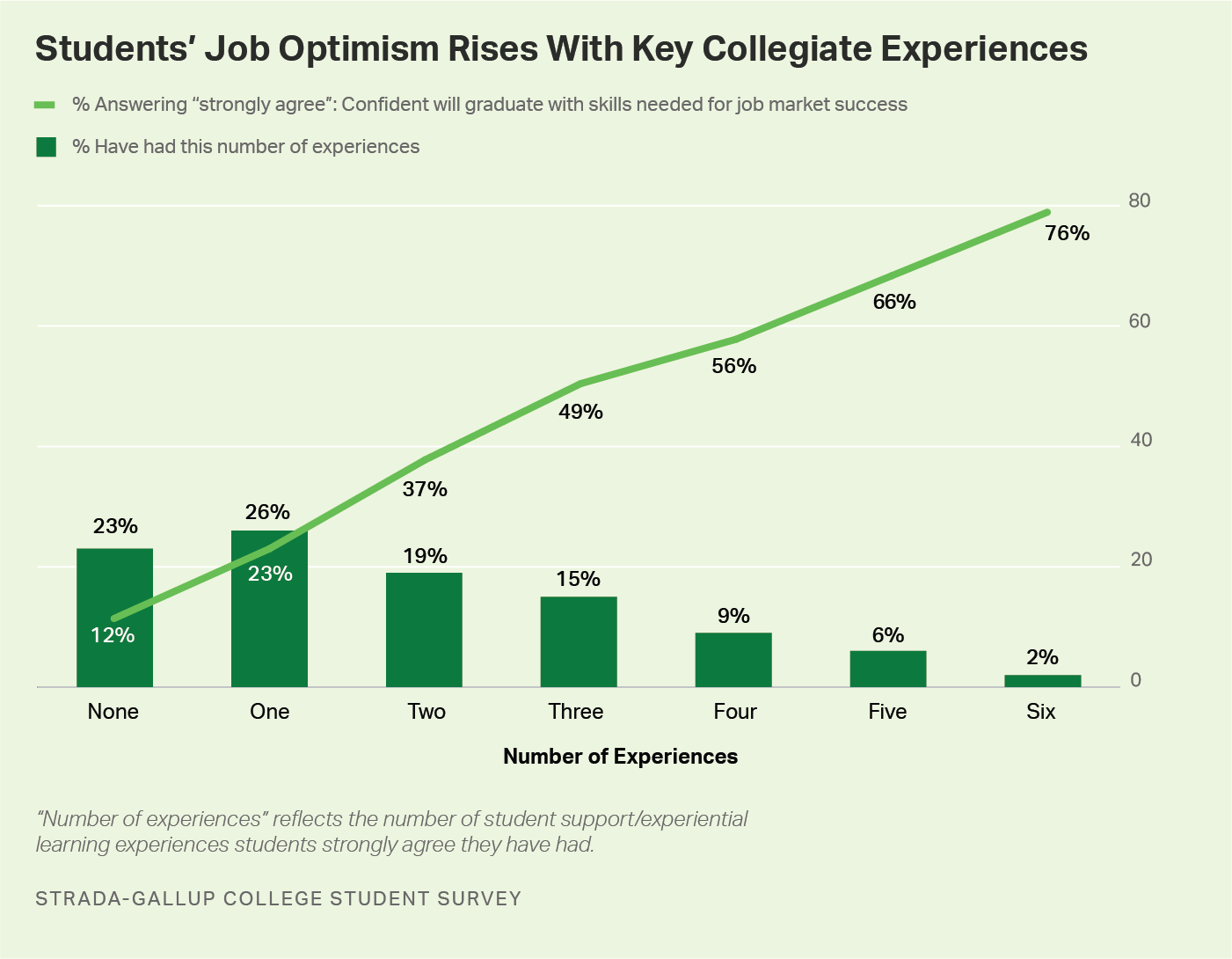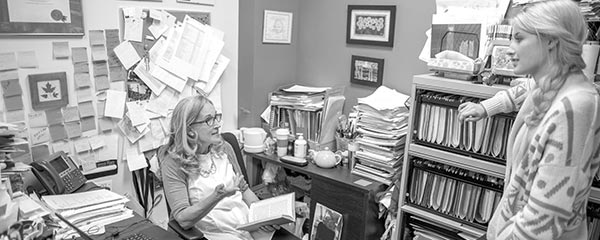Story Highlights
- Many U.S. undergrads uncertain they will succeed in job market
- Six key collegiate experiences linked to higher student confidence
- Results highlight importance of student support, experiential learning
WASHINGTON, D.C. -- When college undergraduates are asked why they decided to get a bachelor's degree, the most commonly cited reason is to get a good job. A study of more than 32,000 U.S. undergrads conducted by Strada Education Network and Gallup indicates that about one-third (34%) strongly agree that they will graduate with the knowledge and skills they need to be successful in the job market, while an additional 37% somewhat agree (by selecting a "4" on the 5-point agreement scale).
The study also illuminates the importance of six collegiate experiences, including how supportive relationships and relevant, engaging learning experiences are linked to long-term outcomes such as higher workplace engagement and wellbeing for college alumni nationwide. The proportion of currently enrolled students who strongly agree that they are confident they will graduate with the skills and knowledge they need to be successful in the job market rises steadily with the number of these experiences they have had.
Among those who strongly agree that they have had three or fewer of these experiences, 28% strongly agree that they are confident they will graduate with the skills and knowledge they need to be successful in the job market. That figure rises from 12% among students who have had none of the six key collegiate experiences to 76% among students who have had all six.

These collegiate experiences are measured by asking students the extent to which they agree with the six statements below. The first three relate to support students receive as undergraduates from professors and mentors. The remaining three ask about students' opportunities for experiential learning.
Support experiences
- My professors at [university] care about me as a person.
- I have at least one professor at [university] who makes me excited about learning.
- I have a mentor at [university] who encourages me to pursue my goals and dreams.
Experiential learning
- While attending [university] have you had an internship or job that allows you to apply what you're learning in the classroom? (answered as yes/no)
- While attending [university] I have worked on a project that took a semester or more to complete.
- I am extremely active in extracurricular activities and organizations.
One in Four Students Strongly Agree They Have a Mentor, Caring Professors
About one in four students interviewed as part of the recent study strongly agree that their professors care about them as people (27%) and that they have a mentor who encourages them to pursue their goals and dreams (25%). At the same time, a majority -- 57% -- strongly agree that they have at least one professor who makes them excited about learning. These results are generally similar to reports of college alumni nationwide from another recent Strada-Gallup survey that asked alumni to think back on their undergraduate experiences.
| Strongly disagree | 2 | 3 | 4 | Strongly agree | |||||||||||||||||||||||||||||||||||||||||||||||||||||||||||||||||||||||||||||||||||||||||||||||
|---|---|---|---|---|---|---|---|---|---|---|---|---|---|---|---|---|---|---|---|---|---|---|---|---|---|---|---|---|---|---|---|---|---|---|---|---|---|---|---|---|---|---|---|---|---|---|---|---|---|---|---|---|---|---|---|---|---|---|---|---|---|---|---|---|---|---|---|---|---|---|---|---|---|---|---|---|---|---|---|---|---|---|---|---|---|---|---|---|---|---|---|---|---|---|---|---|---|---|---|
| % | % | % | % | % | |||||||||||||||||||||||||||||||||||||||||||||||||||||||||||||||||||||||||||||||||||||||||||||||
| My professors at [university] care about me as a person. | 5 | 10 | 24 | 34 | 27 | ||||||||||||||||||||||||||||||||||||||||||||||||||||||||||||||||||||||||||||||||||||||||||||||
| I have at least one professor at [university] who makes me excited about learning. | 3 | 4 | 9 | 27 | 57 | ||||||||||||||||||||||||||||||||||||||||||||||||||||||||||||||||||||||||||||||||||||||||||||||
| I have a mentor at [university] who encourages me to pursue my goals and dreams. | 18 | 17 | 21 | 19 | 25 | ||||||||||||||||||||||||||||||||||||||||||||||||||||||||||||||||||||||||||||||||||||||||||||||
| Strada-Gallup College Student Survey | |||||||||||||||||||||||||||||||||||||||||||||||||||||||||||||||||||||||||||||||||||||||||||||||||||
Prior research has amply documented the importance of mentoring in higher education. Similarly, the current results suggest that supportive relationships with mentors and faculty boost students' assurance that they are gaining the skills and knowledge they will require in their working lives. While barely a third of all students are strongly confident they will graduate with the knowledge and skills they need to be successful in the job market, this rises to 69% among those who strongly agree with all three student support experience statements.
Experiential Learning Linked to Confidence in Job Market
Forty percent of currently enrolled undergraduates say they have had an internship or job that allows them to apply what they are learning, while 24% strongly agree that they have worked on a project that took at least a semester to complete and 18% strongly agree that they are extremely active in extracurricular activities and organizations.
| Yes | No | ||||||||||||||||||||||||||||||||||||||||||||||||||||||||||||||||||||||||||||||||||||||||||||||||||
|---|---|---|---|---|---|---|---|---|---|---|---|---|---|---|---|---|---|---|---|---|---|---|---|---|---|---|---|---|---|---|---|---|---|---|---|---|---|---|---|---|---|---|---|---|---|---|---|---|---|---|---|---|---|---|---|---|---|---|---|---|---|---|---|---|---|---|---|---|---|---|---|---|---|---|---|---|---|---|---|---|---|---|---|---|---|---|---|---|---|---|---|---|---|---|---|---|---|---|---|
| % | % | ||||||||||||||||||||||||||||||||||||||||||||||||||||||||||||||||||||||||||||||||||||||||||||||||||
| U.S. undergraduates overall | 40 | 60 | |||||||||||||||||||||||||||||||||||||||||||||||||||||||||||||||||||||||||||||||||||||||||||||||||
| Strada-Gallup College Student Survey | |||||||||||||||||||||||||||||||||||||||||||||||||||||||||||||||||||||||||||||||||||||||||||||||||||
| Strongly disagree | 2 | 3 | 4 | Strongly agree | |||||||||||||||||||||||||||||||||||||||||||||||||||||||||||||||||||||||||||||||||||||||||||||||
|---|---|---|---|---|---|---|---|---|---|---|---|---|---|---|---|---|---|---|---|---|---|---|---|---|---|---|---|---|---|---|---|---|---|---|---|---|---|---|---|---|---|---|---|---|---|---|---|---|---|---|---|---|---|---|---|---|---|---|---|---|---|---|---|---|---|---|---|---|---|---|---|---|---|---|---|---|---|---|---|---|---|---|---|---|---|---|---|---|---|---|---|---|---|---|---|---|---|---|---|
| % | % | % | % | % | |||||||||||||||||||||||||||||||||||||||||||||||||||||||||||||||||||||||||||||||||||||||||||||||
| While attending [university] I have worked on a project that took a semester or more to complete. | 33 | 15 | 12 | 16 | 24 | ||||||||||||||||||||||||||||||||||||||||||||||||||||||||||||||||||||||||||||||||||||||||||||||
| I am extremely active in extracurricular activities and organizations. | 24 | 19 | 21 | 18 | 18 | ||||||||||||||||||||||||||||||||||||||||||||||||||||||||||||||||||||||||||||||||||||||||||||||
| Strada-Gallup College Student Survey | |||||||||||||||||||||||||||||||||||||||||||||||||||||||||||||||||||||||||||||||||||||||||||||||||||
As expected, students become more likely to have had specific experiential learning experiences as they progress through their college years. Six in 10 seniors (60%), versus 15% of freshmen, report having had an internship or job that allows them to apply what they have learned. Similarly, nearly four in 10 seniors (39%) versus 10% of freshmen have had a project that took a semester or more to complete. The figures for seniors are similar to the results of corresponding questions from the most recent nationwide Strada-Gallup Alumni Survey. (Because the question about extracurricular activities does not refer to a specific experience, it makes sense that students' likelihood to strongly agree does not increase with each year.)
| Freshmen | Sophomores | Juniors | Seniors | ||||||||||||||||||||||||||||||||||||||||||||||||||||||||||||||||||||||||||||||||||||||||||||||||
|---|---|---|---|---|---|---|---|---|---|---|---|---|---|---|---|---|---|---|---|---|---|---|---|---|---|---|---|---|---|---|---|---|---|---|---|---|---|---|---|---|---|---|---|---|---|---|---|---|---|---|---|---|---|---|---|---|---|---|---|---|---|---|---|---|---|---|---|---|---|---|---|---|---|---|---|---|---|---|---|---|---|---|---|---|---|---|---|---|---|---|---|---|---|---|---|---|---|---|---|
| % | % | % | % | ||||||||||||||||||||||||||||||||||||||||||||||||||||||||||||||||||||||||||||||||||||||||||||||||
| Percent "yes" | 15 | 28 | 41 | 60 | |||||||||||||||||||||||||||||||||||||||||||||||||||||||||||||||||||||||||||||||||||||||||||||||
| Strada-Gallup College Student Survey | |||||||||||||||||||||||||||||||||||||||||||||||||||||||||||||||||||||||||||||||||||||||||||||||||||
| Freshmen | Sophomores | Juniors | Seniors | ||||||||||||||||||||||||||||||||||||||||||||||||||||||||||||||||||||||||||||||||||||||||||||||||
|---|---|---|---|---|---|---|---|---|---|---|---|---|---|---|---|---|---|---|---|---|---|---|---|---|---|---|---|---|---|---|---|---|---|---|---|---|---|---|---|---|---|---|---|---|---|---|---|---|---|---|---|---|---|---|---|---|---|---|---|---|---|---|---|---|---|---|---|---|---|---|---|---|---|---|---|---|---|---|---|---|---|---|---|---|---|---|---|---|---|---|---|---|---|---|---|---|---|---|---|
| % | % | % | % | ||||||||||||||||||||||||||||||||||||||||||||||||||||||||||||||||||||||||||||||||||||||||||||||||
| While attending [university] I have worked on a project that took a semester or more to complete. | 10 | 16 | 21 | 39 | |||||||||||||||||||||||||||||||||||||||||||||||||||||||||||||||||||||||||||||||||||||||||||||||
| I am extremely active in extracurricular activities and organizations. | 16 | 19 | 18 | 19 | |||||||||||||||||||||||||||||||||||||||||||||||||||||||||||||||||||||||||||||||||||||||||||||||
| Strada-Gallup College Student Survey | |||||||||||||||||||||||||||||||||||||||||||||||||||||||||||||||||||||||||||||||||||||||||||||||||||
Students who report participating in these three experiential learning opportunities are also the most likely to express confidence in their postgraduation prospects. Among those who have had all three experiential learning opportunities, 59% strongly agree they are confident they will graduate with the knowledge and skills they need to find a good job -- more than twice the proportion (25%) among those who do not strongly agree with any of the items.
Implications
The Strada-Gallup College Student Survey investigates specific actions universities can take to boost students' confidence that they will graduate well-equipped to begin productive, fulfilling careers. The current findings highlight two important criteria that help students maximize the value of their college experience: ensuring that it is 1) relationship-rich and 2) career-relevant.
University leaders can address the first condition through mentoring programs, as well as establishing greater expectations or incentives for faculty to more intentionally build supportive relationships with their students. Faculty members can also help ensure students' education is highly career-relevant through regular discussions with them about potential career options. Such interactions may be invaluable to students, helping many establish the sense of purpose they need in order to succeed in their undergraduate years and well beyond.




